Presupuesto del Estado 2022-23
Aspectos destacados del presupuesto 2022-23
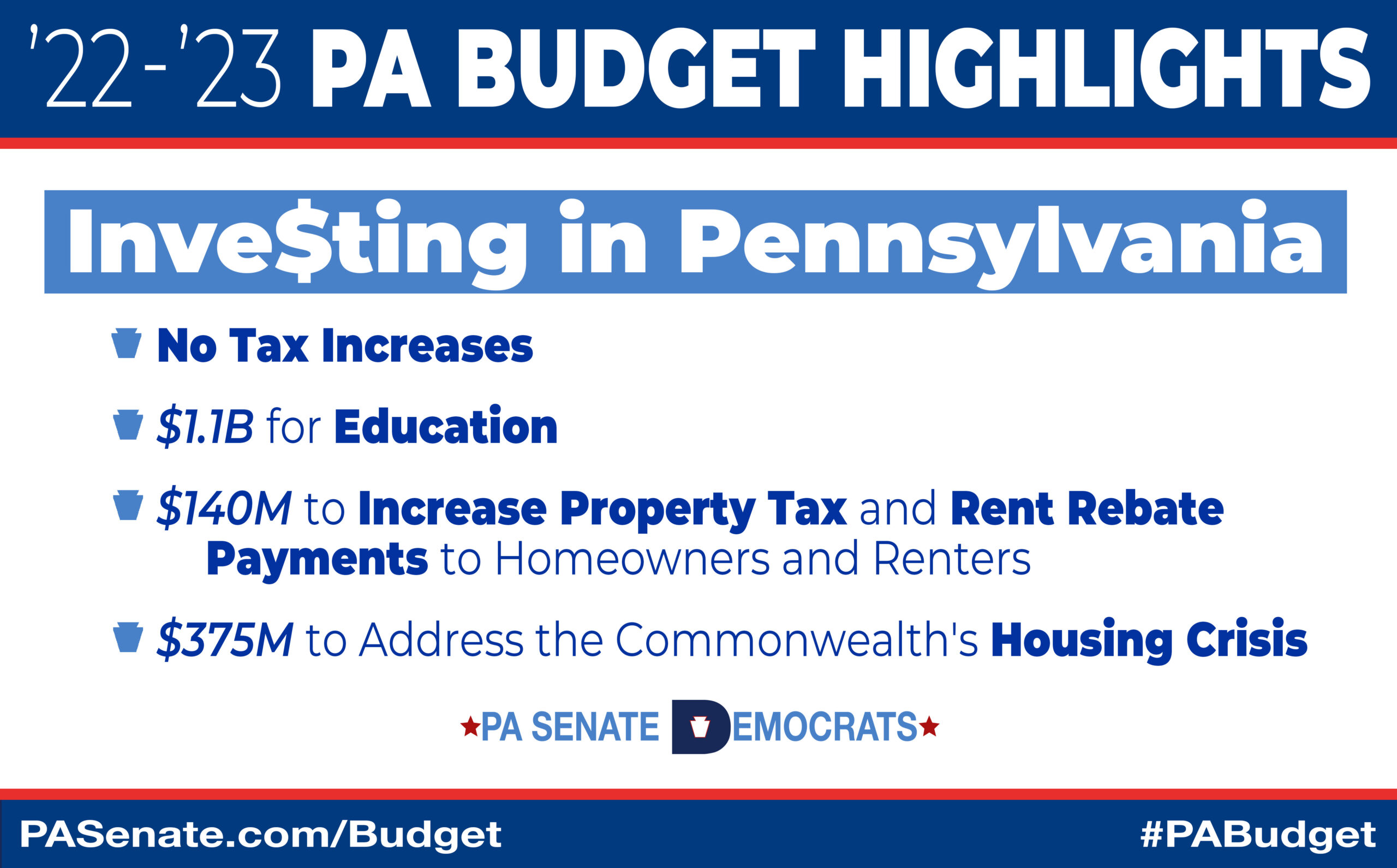
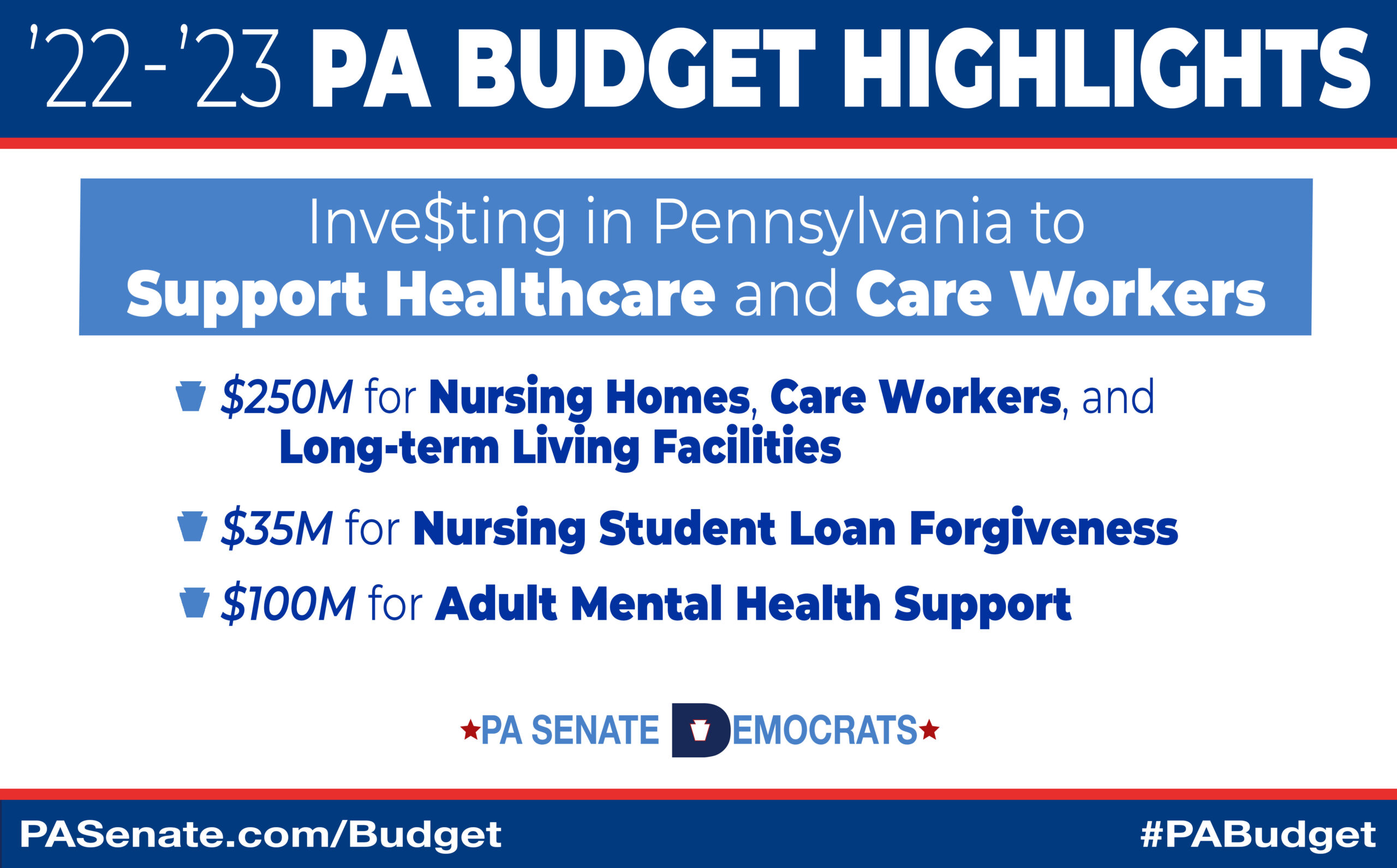
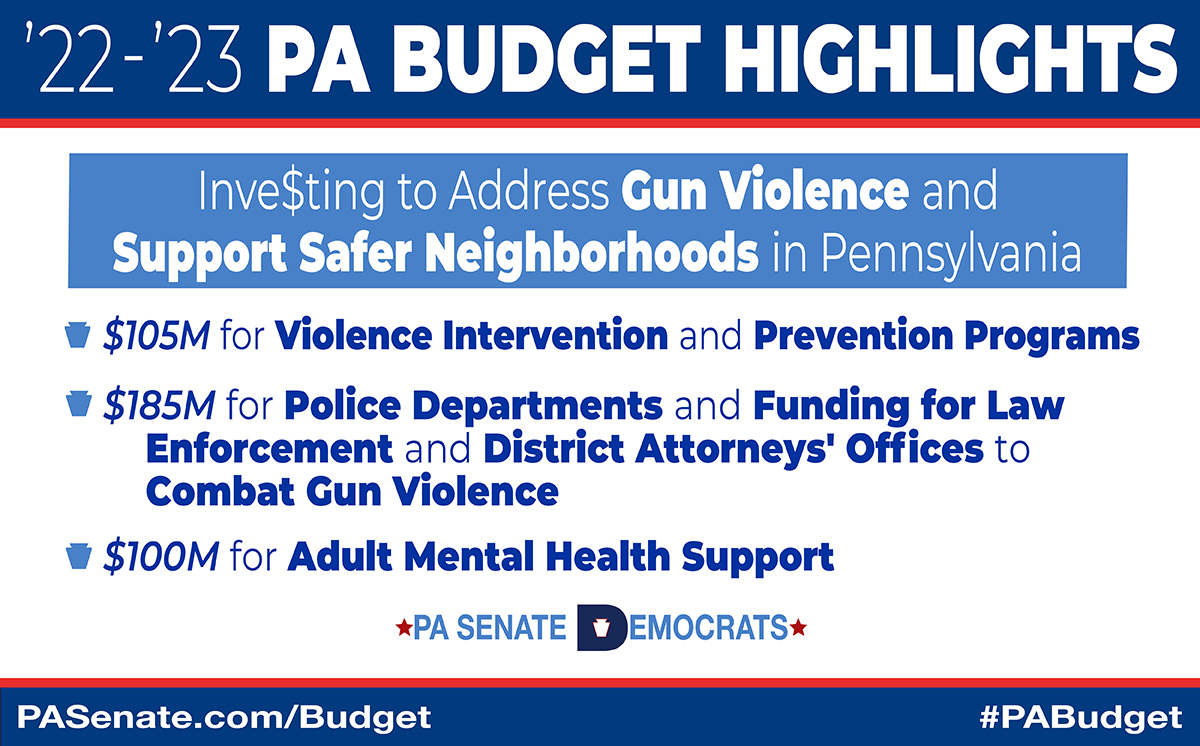
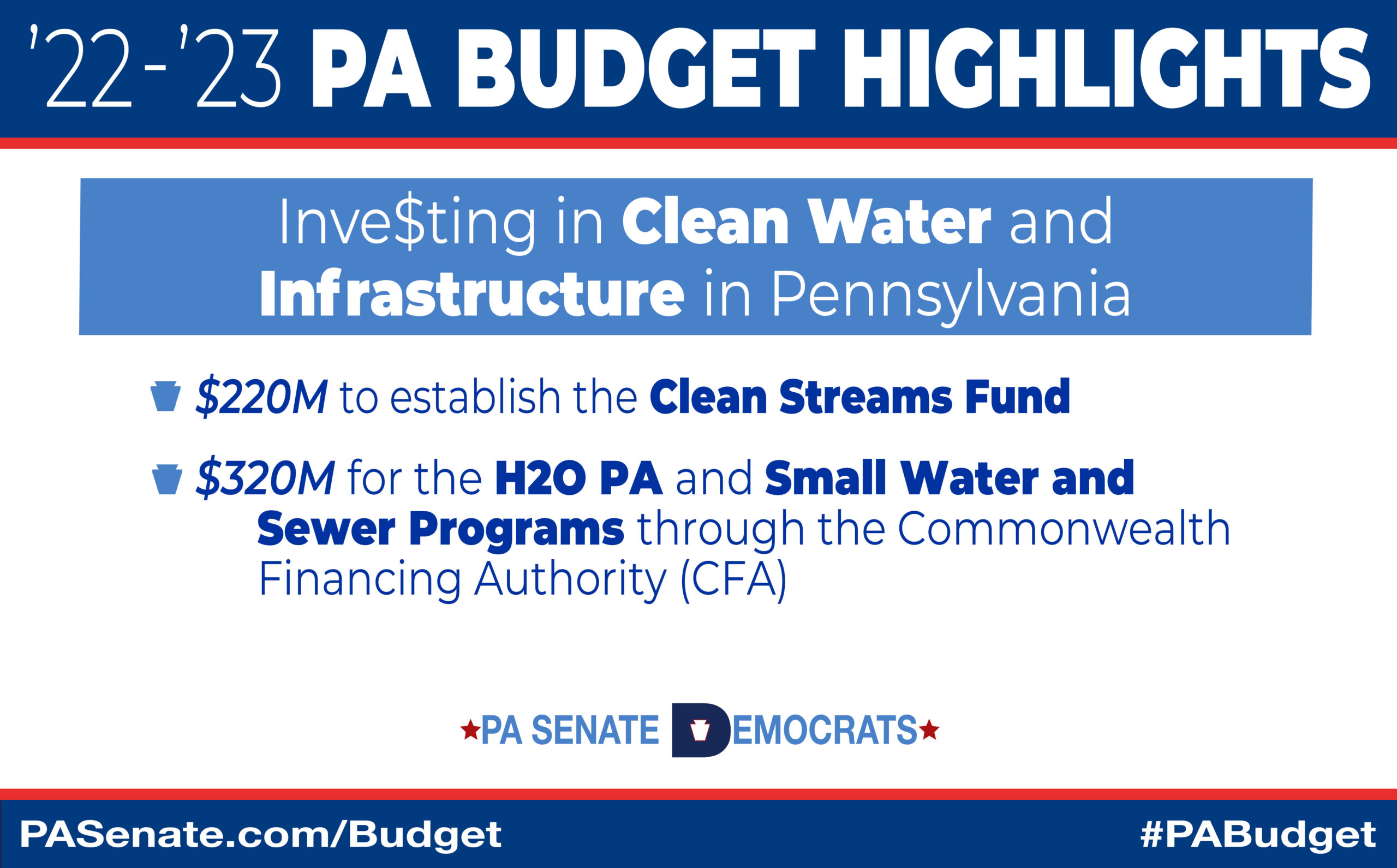
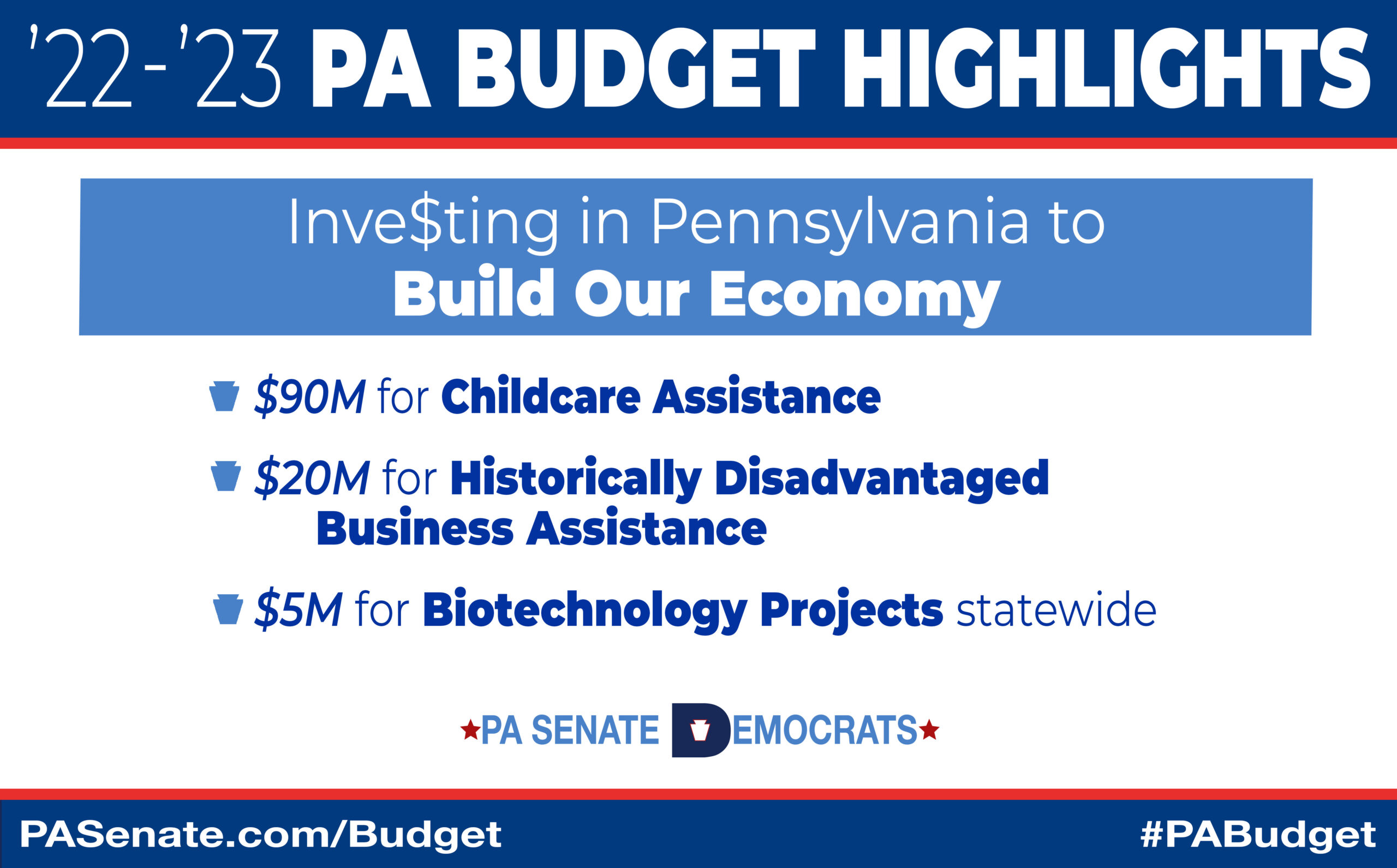
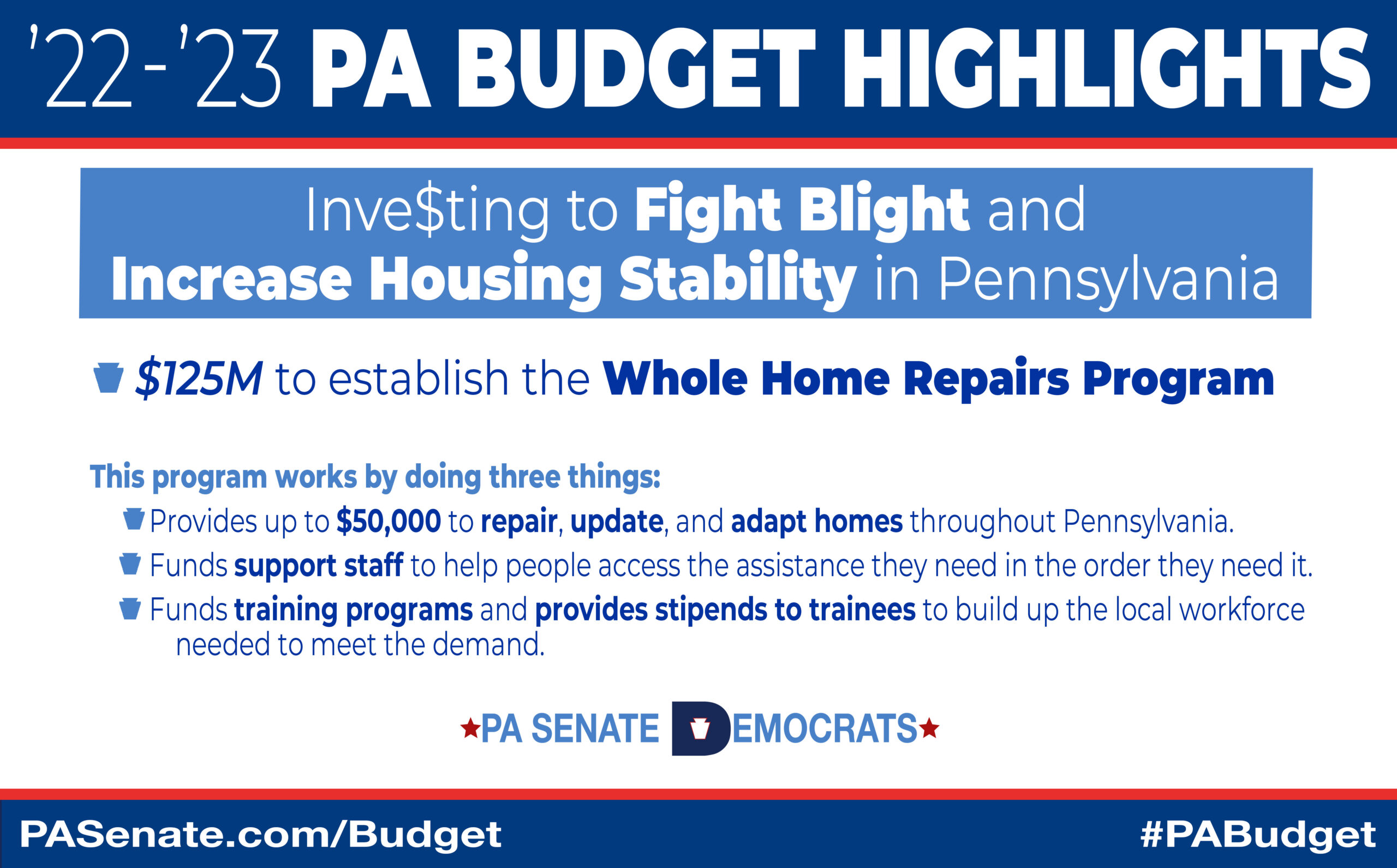
Documentos presupuestarios
2022-23 Presupuesto aprobado
Ejercicio fiscal 2022-23 Fondo General del Estado únicamente (PDF)
2022-23 Estimación de la financiación estatal para los distritos escolares (PDF)
Código Fiscal 2022-23 Plan de rescate americano (PDF)
Resumen del Código Fiscal 2022-23 (PDF)
Disposiciones del Código de Servicios Humanos 2022-23 trasladadas al Código Fiscal (PDF)
Código escolar 2022-23 (PDF)
Código escolar 2022-23 Seguridad escolar (PDF)
Código fiscal 2022-23 (PDF)
Asociaciones público-privadas de transporte (PDF)
Supervisión del taponamiento de pozos de petróleo y gas (PDF)
Proyecto de presupuesto 2022-23
(Presentado por el Gobernador Tom Wolf, 8 de febrero de 2022)
Presupuesto ejecutivo del Gobernador para 2022-23 (PDF)
Resumen del presupuesto 2022-23 (PDF)
Proyecto de presupuesto 2022-23 Dotación presupuestaria (PDF)
Presentación de diapositivas del proyecto de presupuesto para 2022-23 (PDF)
El dolor es real: es hora de invertir en las personas
Sabemos que demasiadas personas están sufriendo económicamente. Sabemos que tenemos que tomar medidas para ayudarles a hacer frente a los precios inflacionistas. Es hora de poner a las personas por encima de los beneficios y los demócratas del Senado quieren proporcionar recursos para ayudar. Esa es nuestra misión. Eso es por lo que estamos luchando en Harrisburg.
Aspectos destacados del proyecto de presupuesto
- Destacados
- Educación
- Desarrollo económico y de la mano de obra
- Sanidad y Servicios Humanos
- Iniciativas medioambientales
- Seguridad pública y justicia penal
- Otras iniciativas de financiación
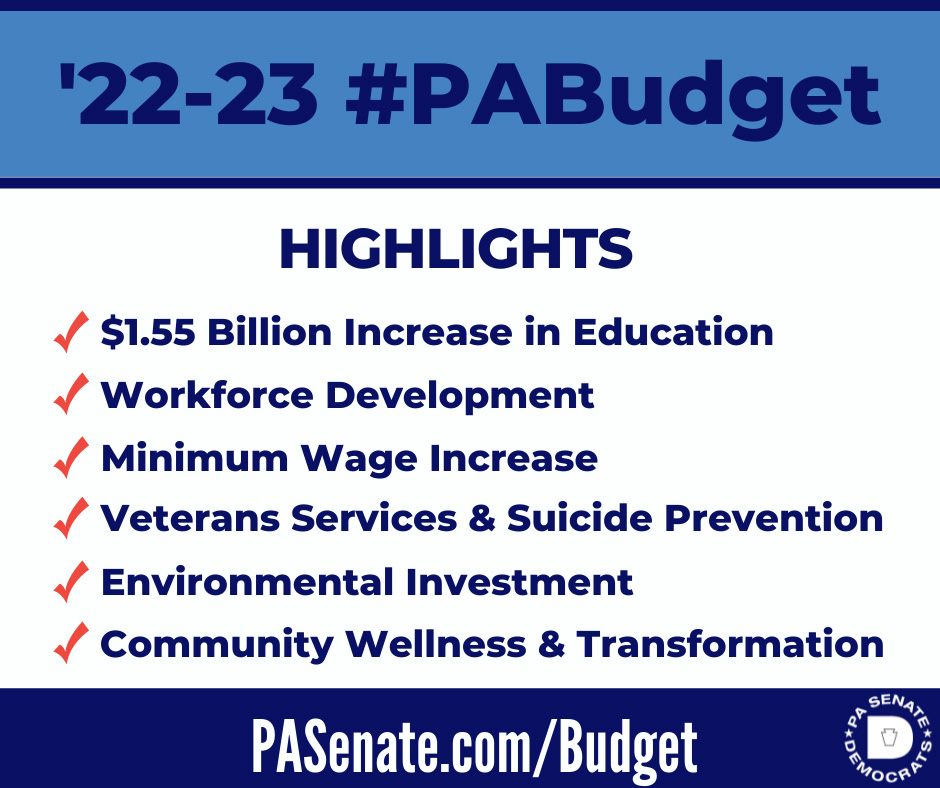 Reforzado por unos sólidos ingresos y por la ayuda federal, el presupuesto propuesto recurre a fondos disponibles sin precedentes para realizar inversiones críticas en Pensilvania y en los pensilvanos. El presupuesto propuesto:
Reforzado por unos sólidos ingresos y por la ayuda federal, el presupuesto propuesto recurre a fondos disponibles sin precedentes para realizar inversiones críticas en Pensilvania y en los pensilvanos. El presupuesto propuesto:
- Invierte en educación en todas las etapas de la vida: primera infancia, educación primaria y secundaria, educación superior y educación de adultos.
- Impulsa la recuperación económica invirtiendo en programas y asociaciones de desarrollo económico y de la mano de obra
- Promueve comunidades seguras y la reforma de la justicia penal mediante la financiación de iniciativas comunitarias de prevención de la violencia armada, programas de reinserción, iniciativas de excarcelación médica y la creación de un fondo para la defensa de los indigentes.
- Refuerza la red de seguridad para los ciudadanos más vulnerables de AP a través de iniciativas de dotación de personal para cuidados a largo plazo, inversiones en servicios a domicilio y comunitarios, reducción de las listas de espera para servicios de identificación, ampliación de los programas de visitas a domicilio, asistencia alimentaria, departamentos locales de salud y servicios para veteranos.
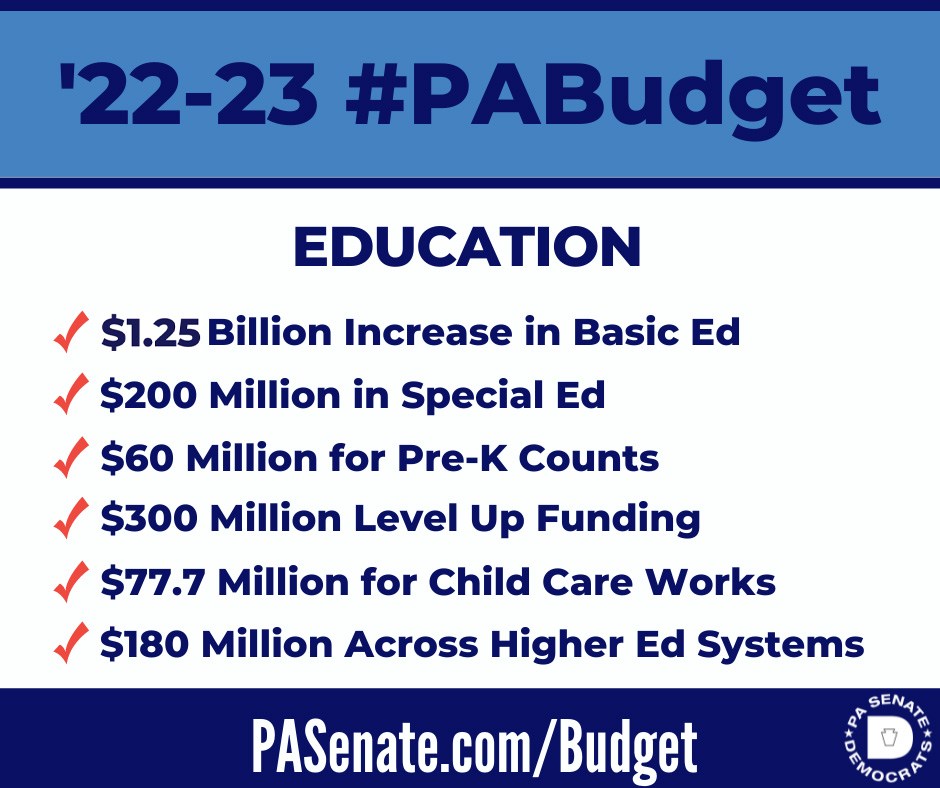 Educación preescolar a 12
Educación preescolar a 12
- Aumento de 1.550 millones de dólares en la financiación de educación básica
- 1.250 millones de dólares con cargo a la fórmula de financiación de la educación básica
- 300 millones de dólares en fondos Level Up para los 100 distritos escolares más necesitados
- Aumento de 200 millones de dólares para la educación especial, que se gestionarán a través de la Fórmula de Financiación de la Educación Especial.
- Más de 70 millones de dólares adicionales para la educación infantil
- Aumento de 60 millones de dólares para Pre-K Counts
- Aumento de 10 millones de dólares para el Programa de Asistencia Suplementaria Head Start
- 1,2 millones de dólares de financiación para ampliar el acceso al seguimiento de Intervención Temp rana añadiendo la depresión posparto como categoría de intervención temprana.
- Aumento de 6,1 millones de dólares para la Educación Profesional y Técnica
- Transferencia de 7 millones de dólares a la Cuenta Restringida de Potenciación para ayudar a las escuelas designadas.
Educación postsecundaria y de adultos
- 500.000 dólares de inversión adicional en programas de alfabetización de adultos y familias
- Aumento de 12,262 millones de dólares para los colegios comunitarios, más 2,604 millones adicionales para el Fondo de Capital de los Colegios Comunitarios.
- Aumento de 75 millones de dólares para el Sistema de Enseñanza Superior del Estado de Pensilvania (PASSHE)
- Mayor apoyo a las universidades y escuelas técnicas superiores relacionadas con el Estado:
- Aumento de 13,442 millones de dólares para la Universidad Estatal de Pensilvania, incluido el apoyo al Pennsylvania College of Technology.
- Aumento de 7,742 millones de dólares para la Universidad de Pittsburgh, incluida la financiación de Rural Education Outreach.
- Aumento de 7,910 millones para la Universidad de Temple
- Aumento de 758.000 dólares para la Universidad Lincoln
- Aumento de 935.000 dólares para la Escuela Superior de Tecnología Thaddeus Stevens
- Aumento de la financiación de los programas PHEAA, incluidos casi 40 millones de dólares para mantener los niveles de subvención actuales, 10,825 millones de dólares en becas Ready to Succeed, un aumento de 1,5 millones de dólares para el Cheyney Keystone Honors Program y 663.000 dólares para becas de asistencia institucional.
- Invierte un total de 200 millones de dólares (dólares ARPA + una parte redirigida de Race HorseDevelopment Funds) para el Programa de Matrícula Nellie Bly, que proporcionaría ayuda financiera a los estudiantes del PASSHE y de los colegios comunitarios cuyo enfoque implique programas en sectores de alta necesidad de la Commonwealth, como la asistencia sanitaria, la educación y el servicio público.
- Destina un millón de dólares a crear la Iniciativa Campus sin Hambre, que concede subvenciones para reducir el hambre y la inseguridad alimentaria en las universidades
- Aumento de 500.000 dólares para la campaña "It's on Us" de lucha contra las agresiones sexuales en los campus.
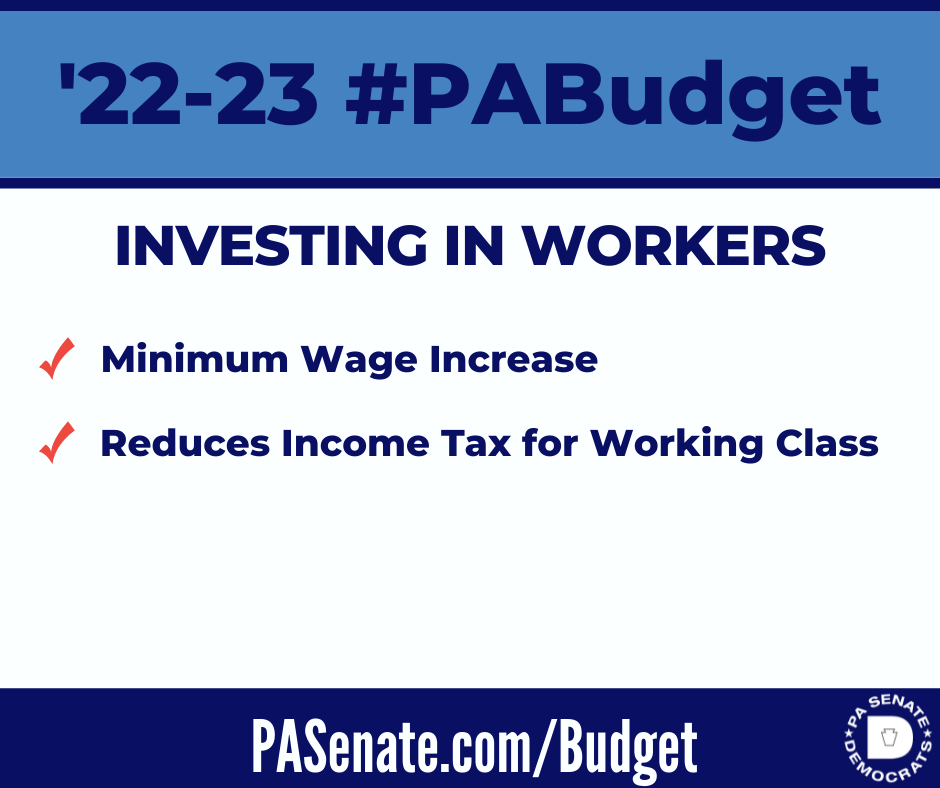 Aumenta la Departamento de Trabajo e Industria Créditos para operaciones del Gobierno General (GGO) en 3,2 millones de dólares para un nuevo sistema de datos estatal que vincule conjuntos de datos de todo el continuo de atención infantil, educación y mano de obra para comprender mejor los resultados y fundamentar la toma de decisiones.
Aumenta la Departamento de Trabajo e Industria Créditos para operaciones del Gobierno General (GGO) en 3,2 millones de dólares para un nuevo sistema de datos estatal que vincule conjuntos de datos de todo el continuo de atención infantil, educación y mano de obra para comprender mejor los resultados y fundamentar la toma de decisiones.- Realiza importantes inversiones de financiación estatal en iniciativas de desarrollo económico y de la mano de obra en el Departamento de Desarrollo Económico y Comunitario (DCED)
- 18 millones de dólares adicionales en apoyo del Fondo de la Autoridad de Desarrollo Tecnológico Ben Franklin y sus esfuerzos para apoyar la tecnología, la innovación y la creación de empresas.
- Incluye 1,5 millones de dólares para nuevas subvenciones competitivas a Centros de Recursos Industriales para la prestación de servicios innovadores.
- Incluye 1,5 millones de dólares para nuevas subvenciones competitivas a organizaciones en el marco de las Asociaciones para el Rendimiento Económico Regional (PREP) para fomentar las asociaciones con instituciones de enseñanza superior.
- 2,35 millones de dólares de financiación estatal para potenciar los esfuerzos del programa Invent Penn State, que apoya a los emprendedores y fomenta las colaboraciones intersectoriales.
- Incluye 30 millones de dólares en el Departamento de Servicios Generales (DGS) para proporcionar acceso a guarderías de alta calidad y bajo coste a los empleados de la mancomunidad, tanto a través de instalaciones patrocinadas como de la opción de un subsidio progresivo que se utilizará para el cuidado en una instalación de elección.
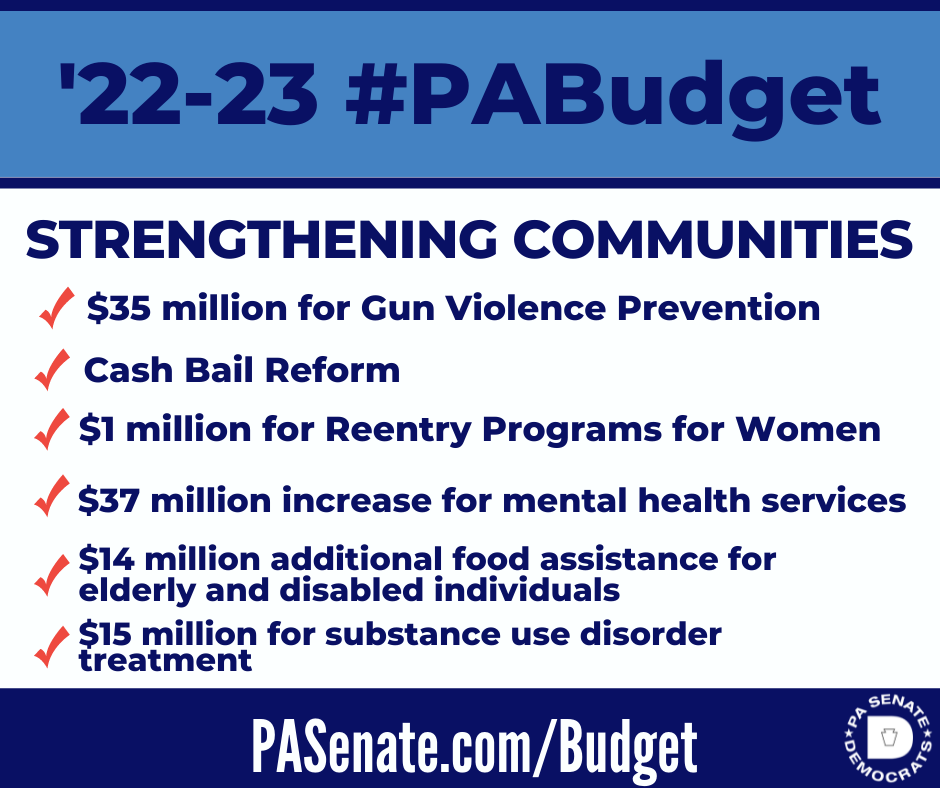 Departamento de Envejecimiento
Departamento de Envejecimiento
- $667,000 en Fondos de Lotería adicionales para proporcionar recursos adicionales del Departamento de Envejecimiento para servicios de protección de adultos mayores.
Departamento de Sanidad (DOH)
- Casi 4 millones de dólares de aumento de la financiación de las operaciones del Departamento de Salud para mejorar la infraestructura de salud pública.
- 7,2 millones de dólares adicionales para los departamentos de salud de los condados y municipios en virtud de la Ley 315, lo que eleva la ayuda estatal a la subvención máxima de 6 dólares per cápita por ley.
- Un nuevo crédito de 5 millones de dólares en el Departamento de Sanidad para apoyar la investigación en terapia génica.
- Aborda las preocupaciones de costos en torno a las nuevas regulaciones de personal DOH centro de enfermería especializada, proporcionando $ 190,1 millones en fondos totales ($ 91,25 millones de fondos estatales) para ajustar las tasas de asistencia médica para los proveedores de centros de enfermería especializada a partir de enero de 2023 y $ 14 millones para los seis hogares de veteranos de la Commonwealth.
Departamento de Servicios Humanos (DHS)
- El presupuesto propuesto asume la expiración de la emergencia de salud pública federal (PHE) para el nuevo año fiscal, lo que resulta en gastos estatales temporalmente compensados por una contrapartida federal adicional que se cubrirá con Fondos Generales.
- Los gastos estatales del departamento aumentan en un total de casi 2.200 millones de dólares para tener en cuenta este cambio en la financiación.
- Como criterio para recibir la contrapartida federal mejorada durante el PHE, se exigió a los estados que mantuvieran los niveles del programa anteriores a la pandemia, incluida la ausencia de redeterminaciones que dieran lugar a que un afiliado perdiera las prestaciones.
- Con la supuesta expiración del PHE, el presupuesto propuesto supone un ahorro neto de más de 446 millones de dólares debido a las redeterminaciones que afectan al número de casos.
- 1,7 millones de dólares en recursos operativos adicionales para el DHS para la concesión de licencias, presupuestos y apoyo a programas, incluyendo el desarrollo de un equipo de respuesta a crisis de bienestar infantil.
- Financiación suficiente para aplicar la ampliación de la cobertura materna posparto en el programa de Asistencia Médica de 60 a 365 días.
- Financiación estatal en la asignación para trabajadores con discapacidades de MA para implementar el Programa de Trabajadores con Éxito Laboral según la Ley 69 de 2021.
- Reforzar los cuidados de larga duración y los servicios a domicilio y comunitarios:
- 280.000 dólares para la iniciativa "Agency With Choice" (Agencia con capacidad de elección), destinada a ampliar los recursos de formación de los trabajadores de servicios a domicilio y comunitarios. Esta iniciativa permite a los participantes elegir a sus cuidadores directos con el apoyo de una agencia proveedora.
- 4,4 millones de dólares para prestar servicios de atención gestionada a largo plazo del programa LIFE a otros 372 ciudadanos de Pensilvania.
- 50 millones de dólares para aumentar los pagos suplementarios a las residencias de cuidados personales.
- 14,3 millones de dólares de financiación estatal para aumentar la prestación mensual mínima del SNAP para personas mayores o discapacitadas.
- Invertir en Servicios de Salud Mental con 36.652 millones de dólares para restablecer dos tercios de la financiación básica a los condados.
- Inversiones continuas en atención comunitaria para personas con discapacidad intelectual:
- 1,25 millones de dólares para la transición de 20 personas que viven actualmente en hospitales públicos a entornos comunitarios (CHIPP)
- 18,8 millones para prestar servicios a personas en lista de espera urgente en el programa ID Community Waiver
- 5,2 millones de dólares para trasladar a más personas de centros de cuidados intermedios al programa de exención comunitaria para discapacitados
- 1,8 millones de dólares para ampliar a todo el estado los programas de defensores especiales designados por los tribunales (CASA)
- 15 millones de dólares para ampliar el acceso a programas de visitas domiciliarias basados en pruebas
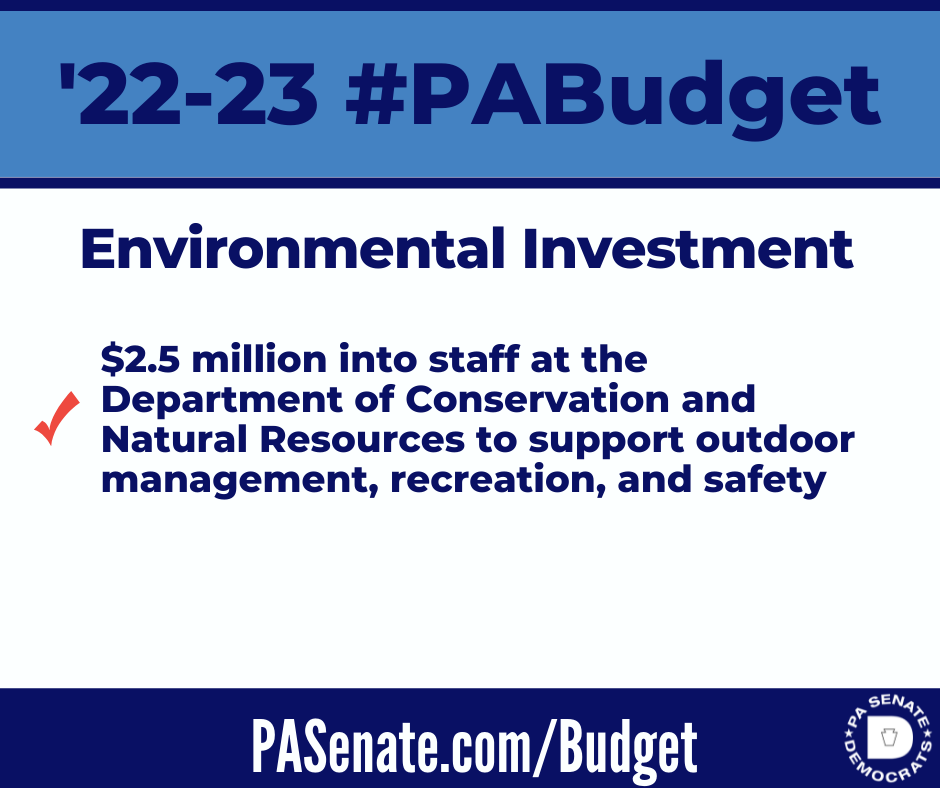 Un aumento estatal combinado de 2,5 millones de dólares se reparte entre las asignaciones de Operaciones del Gobierno General (GGO), Parques Estatales y Bosques Estatales del Departamento de Conservación y Recursos Naturales (DCNR) para personal adicional de apoyo a la gestión de actividades al aire libre, recreativas y de seguridad.
Un aumento estatal combinado de 2,5 millones de dólares se reparte entre las asignaciones de Operaciones del Gobierno General (GGO), Parques Estatales y Bosques Estatales del Departamento de Conservación y Recursos Naturales (DCNR) para personal adicional de apoyo a la gestión de actividades al aire libre, recreativas y de seguridad.- 5 millones de dólares en fondos estatales dentro de un nuevo crédito de Gestión de Plagas Forestales en DNCR para el seguimiento y control de las amenazas de insectos para la salud de los bosques.
- Un adicional de $ 5 millones en fondos estatales dentro de la asignación de Gestión de Programas Ambientales en el Departamento de Protección del Medio Ambiente
(DEP) para financiar nuevas posiciones para cumplir con las necesidades programáticas y operativas críticas relacionadas con el apoyo de agua limpia, vías fluviales y humedales.
Captura, Utilización y Almacenamiento de Carbono (CCUS) y el hidrógeno - Un adicional de
$ 100.000 a través de la asignación de DCED GGO para apoyar un plan estratégico para la descarbonización del sector industrial a través del despliegue de CCUS y tecnologías de hidrógeno en la mancomunidad. - Una nueva transferencia de 10 millones de dólares del Fondo General al Fondo de Reciclaje para hacer frente a los problemas de solvencia.
- El DEP recibirá una importante inyección de nuevos fondos federales de la Ley de Inversión en Infraestructuras y Empleo para ámbitos como el taponamiento de pozos huérfanos, los programas energéticos, la resistencia de la red eléctrica, la eficiencia y conservación energéticas, la recuperación de minas abandonadas y la ayuda a comunidades pequeñas y desfavorecidas.

- Un aumento de 5 millones de dólares para el Programa de Intervención y Prevención de la Violencia en el PCCD para subvenciones y asistencia técnica en apoyo de los esfuerzos comunitarios de prevención de la violencia armada. El total de fondos disponibles aumentará a 35 millones de dólares.
- Una transferencia de 10 millones de dólares para el Programa de Subvenciones de Seguridad sin Ánimo de Lucro del PCCD.
- 1 millón de dólares para establecer un Fondo de Defensa de Indigentes en el PCCD. Los fondos se utilizarán para proporcionar una representación legal justa y adecuada a los acusados indigentes.
- Un millón de dólares a través del PCCD para servicios de reinserción a nivel local para mujeres que regresan a su comunidad, con el fin de darles la mejor oportunidad de empezar de cero y reducir la reincidencia.
- Para proporcionar asistencia técnica adicional a las oficinas de libertad condicional de menores del condado y mejorar la coherencia entre los condados, se incluyen 425.000 dólares adicionales para la Comisión de Jueces de Tribunales de Menores para aumentar los recursos de personal.
- 45 millones de dólares para el Programa de Subvenciones de Seguridad Escolar en el PCCD. El programa concede subvenciones a las escuelas para mejoras de seguridad y programas de comportamiento.
- 141 millones de dólares del Fondo General a la Policía Estatal de Pensilvania para reducir la dependencia del Fondo de Licencias de Motor y para apoyar dos nuevas clases de cadetes con el objetivo de graduar a 300 nuevos policías.
- 7,7 millones de dólares en financiación de la tecnología necesaria para aumentar la seguridad pública y de los agentes del orden incrementando el uso de grabadoras de vídeo móviles y cámaras corporales.
- 7,1 millones de dólares en la partida de Servicios de Salud Mental (Departamento de Servicios Humanos) para proporcionar plazas a personas difíciles de colocar que salen de centros penitenciarios.
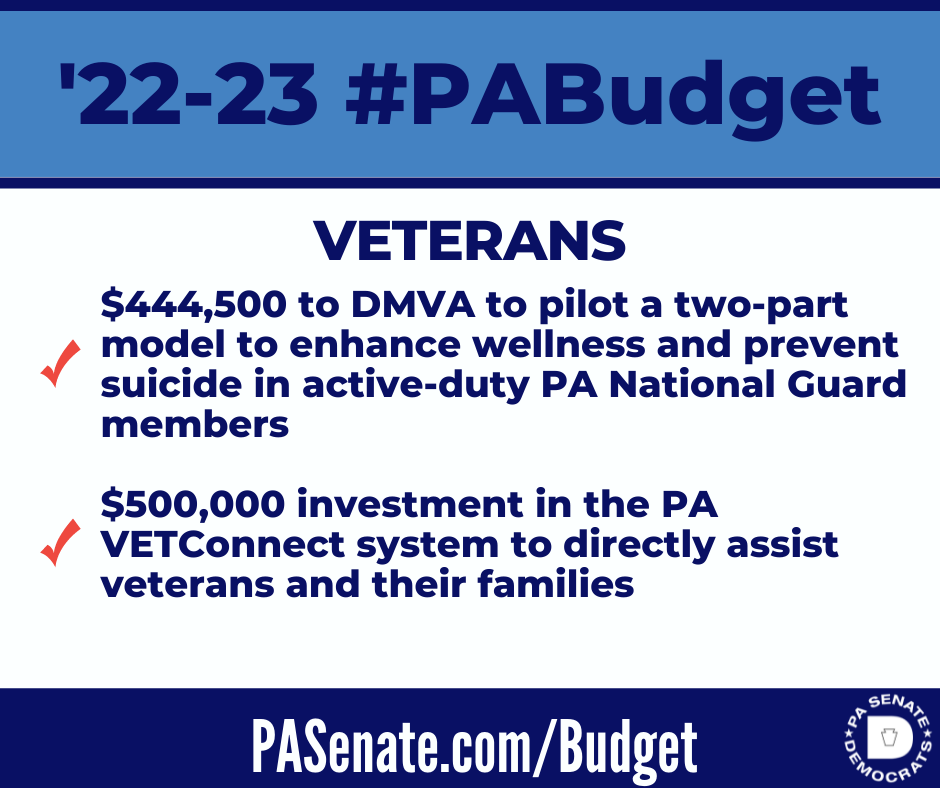
- Incluye financiación estatal equivalente en algunas líneas operativas para maximizar la financiación federal de inversiones en infraestructuras.
- Un aumento de 1,598 millones de dólares para el Centro de Enfermedades Infecciosas de PENNVET.
- Aumento de la inversión de 3,5 millones de dólares en Preparación y Respuesta Agrícola para vigilar y responder al impacto de las especies invasoras.
- 2 millones de dólares adicionales para el Programa Estatal de Adquisición de Alimentos (PASS) del Departamento de Agricultura.
- 250.000 dólares de financiación estatal adicional con cargo al DCED para apoyar las actividades de America250PA, la organización que encabeza la celebración en Pensilvania del 250 aniversario de los Estados Unidos.
- Inversiones adicionales para actividades relacionadas con las elecciones. Esta inversión incluye un aumento de 41.000 dólares para aumentar los recursos destinados a las actividades de registro de votantes, 2 millones de dólares para una campaña de divulgación electoral y 3,575 millones de dólares para aumentar los recursos destinados a modernizar las elecciones de Pensilvania y la concesión de licencias notariales.
- Aumento de las ayudas a los veteranos:
- 500.000 dólares en el sistema PA VETConnect para establecer recursos, conectar socios y ayudar directamente a los veteranos y sus defensores.
- 284.000 dólares para el programa de Subvenciones a Funcionarios de Servicios a Veteranos del DMVA.
- 445.000 dólares para poner a prueba un modelo en dos partes destinado a mejorar el bienestar y prevenir el suicidio entre los miembros en activo de la Guardia Nacional de Pensilvania mediante el uso de las mejores prácticas y evaluaciones e intervenciones basadas en pruebas.






Dirección presupuestaria
El martes 8 de febrero de 2022, el gobernador pronunció su discurso final sobre el presupuesto, en el que presentó su plan para el ejercicio fiscal 2022-23.
Vea la recapitulación y el discurso completo a continuación.
Audiencias sobre el presupuesto 2022-23
Noticias presupuestarias
Reacción del Senador Jay Costa a los Presupuestos del Estado de PA para 2022-23
Declaración del líder demócrata del Senado, Jay Costa, sobre los presupuestos del Estado
Harrisburg, PA - 8 de julio de 2022 - El líder demócrata del Senado del Estado de Pensilvania, Jay Costa, votó hoy a favor del presupuesto estatal para el año fiscal 2022-23. "Dado nuestro superávit de ingresos sin precedentes, los demócratas del Senado lucharon incansablemente para garantizar un acuerdo que...

